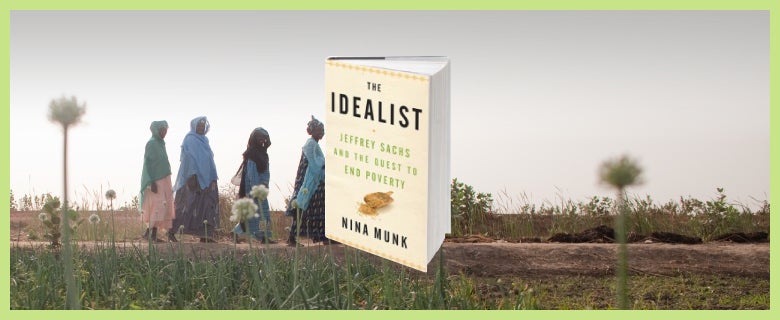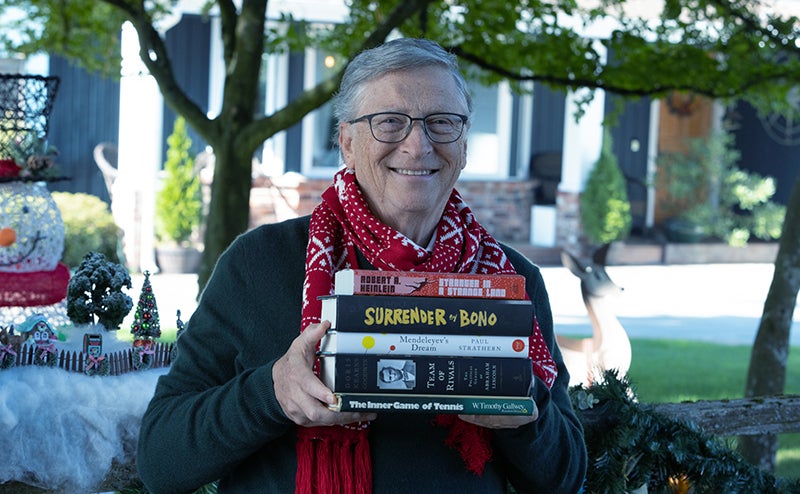We need to make the planet a better place to live, which means ensuring that everyone has an equal chance to survive and thrive no matter where they’re born.
Bono calls the economist Jeffrey Sachs “the squeaky wheel that roars.” To me, Sachs is the Bono of economics—a guy with impressive intelligence, passion, and powers of persuasion who is devoting his gifts to speaking up for the poorest people on the planet. So it was no surprise to me that a journalist would find Sachs to be a compelling central character for a book—and a good way to draw readers into the potentially dry subject of international development.
In The Idealist, Vanity Fair writer Nina Munk draws a nuanced portrait of Sachs and his Millennium Villages Project (MVP)—a $120 million demonstration project intended to show the world that it’s possible to lift African villages out of poverty through a massive infusion of targeted assistance. It would have been easy, and perhaps more marketable, for Munk to draw a caricature, overly accentuating Sachs’s negative qualities at the expense of his great gifts. But she doesn’t. Munk spent six years researching the book, getting to know Sachs well and living for extended periods in two of the 15 Millennium Villages. She clearly appreciates the importance and difficulty of what Sachs and his team are attempting to do.
Unlike most books about international development, Munk’s book is very readable and not long (260 pages). I’ve told everyone at our foundation that I think it is worth taking the time to read it. It’s a valuable—and, at times, heartbreaking—cautionary tale. While some of the Millennium Villages have succeeded in helping families improve their health and incomes, Munk concludes that the two villages she spent the most time studying—Dertu, Kenya and Ruhiira, Uganda—have so far not lived up to Sachs’s vision.
Sachs did come to the foundation, asking us to support the Millennium Villages. His pitch was intriguing. He was picking a small handful of villages to be the focus of intense interventions in health, education, and agriculture—all at once. His hypothesis was that these interventions would be so synergistic that they would start a virtuous upward cycle and lift the villages out of poverty for good. He felt that if you focus just on fertilizer without also addressing health, or if you just go in and provide vaccinations without doing anything to help improve education, then progress won’t be sustained without an endless supply of aid.
My colleagues and I had a number of concerns about Sachs’s approach. We questioned his assumptions about how quickly the gains would materialize, what would happen when the MVP funding was phased out, how much governments would contribute to offset the high per-person costs, and how feasible it was to measure progress (given the likelihood that people from the surrounding area would stream into their villages once the MVP aid started flowing). So we decided not to invest in the MVP directly. Instead we funded his interdisciplinary work at Columbia University’s Earth Institute, because we felt it was invaluable to have him focused on the needs of poor countries.
Based on what Munk reports about the MVP, I’m not about to throw stones. We have many projects of our own that have come up short. It’s hard to deliver effective solutions, even when you plan for every potential contingency and unintended consequence. There is a natural tendency in almost any kind of investment—business, philanthropic, or otherwise—to double down in the face of difficulty. I’ve done it, and I think most other people have too.
So what went wrong? For one thing, the villages that Sachs picked experienced all kinds of problems—from drought to political unrest. For another, the MVP began with an idealistic “Field of Dreams” approach. MVP leaders encouraged farmers to switch to a series of new crops that were in demand in richer countries—and experts on the ground did a good job of helping farmers to produce good crop yields by using fertilizer, irrigation, and better seeds. But the MVP didn’t simultaneously invest in developing markets for these crops. According to Munk, “Pineapple couldn’t be exported after all, because the cost of transport was far too high. There was no market for ginger, apparently. And despite some early interest from buyers in Japan, no one wanted banana flour.” The farmers grew the crops, but the buyers didn’t come.
Of course, Sachs knows that it’s critical to understand market dynamics; he’s one of the world’s smartest economists. But in the villages Munk profiled, Sachs seems to be wearing blinders.
Warren Buffett likes to say, “The rear-view mirror is always clearer than the windshield.” Through that rear-view mirror, we can see that the project didn’t have an economic model that could sustain successes once the MVP dollars ran out. All of the interventions involved—health, agriculture, infrastructure, education, and business seed money—make sense if carried out carefully, over time. But I am surprised by how little Sachs dug into country budgets and that he didn’t work to convince governments to commit to additional taxation to fund more of these interventions domestically. Given his background, he surely excels in that area.
Through the rear-view mirror, we can also see that many of Sachs’s ideas have proved to be exactly right. Munk details his 2007 fight with international aid donors who were refusing to distribute insecticide-treated bed nets for free because they favored a market-based approach where people would pay a small amount for each net. To put it mildly, Sachs didn’t make any friends in the process of advancing his case for free bed nets. Through increasingly ruthless tirades, he wound up alienating potential allies who want to defeat malaria just as badly as he does. But history will show that Sachs was absolutely right. Since then, we’ve seen that the free model has allowed for much broader distribution of bed nets—and much greater reductions in malaria—than market models.
In the end, I hope poverty fighters will not let what they read in this book stop them from investing and taking risks. In the world of venture capital, a success rate of 30 percent is considered a great track record. In the world of international development, critics hold up every misstep as proof that aid is like throwing money down a rat hole. When you’re trying to do something as hard as fighting poverty and disease, you will never achieve anything meaningful if you’re afraid to make mistakes.
I greatly admire Sachs for putting his ideas and reputation on the line. After all, he could have a good life doing nothing more than teaching two classes a semester and pumping out armchair advice in academic journals. But that’s not his style. He rolls up his sleeves. He puts his theories into action. He drives himself as hard as anyone I know.
I have no doubt that Sachs, like all relentless thinkers and doers, will come back with stronger ideas and approaches. Sachs will always be a squeaky wheel that roars. And the world will be a better place for it.





